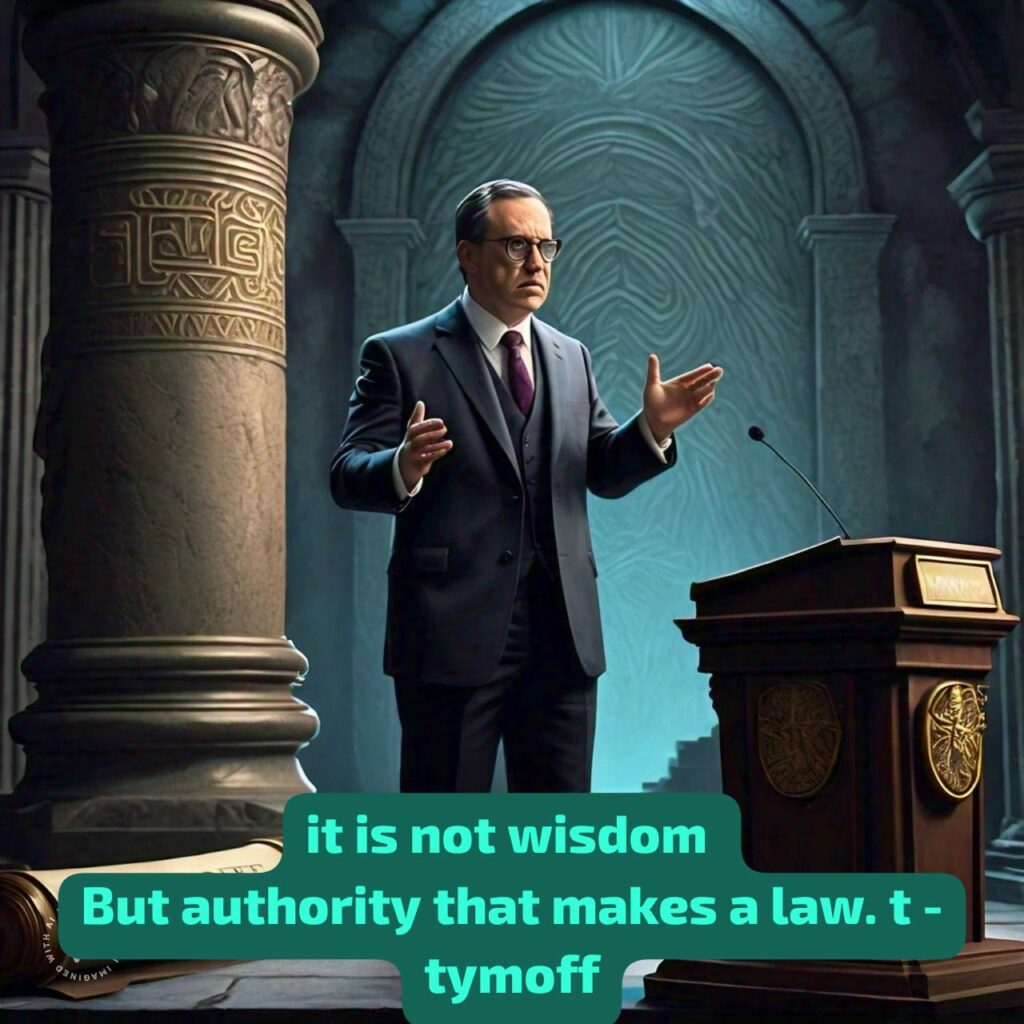In the realm of jurisprudence, the axiom “it is not wisdom but authority that makes a law. t – tymoff” reverberates as a pivotal point of contention. Attributed to the esteemed legal scholar T. Tymoff, this statement serves as a fulcrum for profound reflection and analysis. In this comprehensive exploration, we embark on a journey to unravel the intricate interplay between authority and wisdom within the framework of legal systems worldwide.
Unveiling the Dominance of Authority
Tymoff’s assertion, “it is not wisdom but authority that makes a law. t – tymoff,” lays bare the undeniable dominance of authority in the establishment of legal frameworks. Across epochs, lawmaking entities, whether monarchs, legislative bodies, or judicial systems, have wielded the power to codify rules and enforce them with unwavering rigor.
It is this authority that bestows legitimacy upon the legal code, irrespective of its ethical underpinnings. Citizens are bound to comply with the law not solely due to its alignment with moral principles but also due to the repercussions of defiance – ranging from sanctions to incarceration. This enforcement mechanism underscores the pivotal role of authority in cementing the status of law.
The Historical Tapestry of Authority in Law
Throughout history, myriad instances attest to the prominence of authority in shaping legal paradigms. Monarchs, wielding unbridled power, often promulgated laws to consolidate their rule and suppress dissent. The dictums of colonial powers, imposed upon conquered territories, often trampled upon indigenous customs and traditions.
In these instances, law emerges as a tool of control wielded by the predominant authority, showcasing the autonomous potency inherent in authority’s role in shaping legal landscapes.
Embracing the Allure of Wisdom
However, amidst the shadow of authority, the allure of wisdom cannot be dismissed. At its zenith, the law aspires to embody the collective moral consciousness, epitomizing a shared comprehension of righteousness and injustice.
Laws endeavor to safeguard individual rights, champion fairness, and foster societal harmony. It is this embodiment of wisdom that infuses law with a sense of legitimacy transcending mere enforcement.
The Triumph of Wisdom Over Coercion
Consider the protracted and arduous struggle for human rights. Laws prohibiting discrimination, ensuring egalitarianism before the law, and safeguarding fundamental freedoms epitomize the triumph of wisdom over coercive authority.
These laws emanate from a communal acknowledgment of inherent human dignity and the imperative for a just societal order. Their enduring influence lies not merely in the specter of punitive measures but in their resonance with our profound moral convictions.
Harmonizing Authority and Wisdom
The quintessence of a robust legal system lies in the symbiotic interplay between authority and wisdom. A purely authoritarian regime, bereft of ethical considerations, risks descending into tyranny and eventual collapse. Conversely, laws predicated solely on abstract ideals, devoid of enforceability, would prove futile in maintaining societal order.
Achieving Equilibrium: The Ideal Legal Framework
The apotheosis of an ideal legal framework lies in harnessing the legitimacy conferred by authority to promulgate laws underpinned by robust moral principles. This necessitates a robust legislative apparatus integrating public discourse, expert scrutiny, and ethical contemplation. Furthermore, it mandates an impartial judiciary tasked with interpreting laws through established legal paradigms, thereby ensuring equity and averting the capricious exercise of power.
The Perpetual Quest: Striking a Balance
The tension between authority and wisdom constitutes a perennial facet of legal systems. Laws inexorably metamorphose to mirror evolving societal norms and ethical precepts. This engenders an ongoing imperative for introspection and reform. Legal institutions must remain receptive to critique and adaptable to ensure that laws not only retain enforceability but also retain ethical integrity.
Public Discourse: Catalyst for Change
Public discourse emerges as an indispensable catalyst in this ongoing endeavor. Enlightened citizens who actively engage with the law, pose pertinent inquiries, and advocate for reform contribute indispensably to the evolution of a legal framework resonant with the collective wisdom of society.
Conclusion: It Is Not Wisdom But Authority That Makes A Law. T – Tymoff
Tymoff’s incisive proclamation, “it is not wisdom but authority that makes a law. t – tymoff,” impels us to transcend the confines of simplistic dichotomies. Law neither constitutes a mere byproduct of coercive authority nor a mere reflection of abstract ideals.
Rather, it emerges as the product of a multifaceted interplay between the authority that enunciates it and the wisdom that informs its substance. By embracing this intricate relationship, we embark upon a journey towards crafting legal systems that are simultaneously efficacious and equitable.
Frequently Asked Questions (FAQs)
1. What is the significance of T. Tymoff’s quote “It is not wisdom, but authority that makes a law”?
Answer: T. Tymoff’s quote underscores the role of authority in legitimizing laws, regardless of their intrinsic fairness. It highlights the power dynamics inherent in lawmaking.
2. How do laws evolve over time to reflect changing societal values and ethical understandings?
Answer: Laws undergo adaptation as societal norms evolve, necessitating continual re-evaluation and reform. This process ensures that legal frameworks remain relevant and reflective of contemporary values.
3. What role does wisdom play in shaping laws that promote fairness and justice?
Answer: Wisdom informs the crafting of laws that uphold individual rights, advocate for equality, and foster societal order. These laws resonate with moral convictions, contributing to the establishment of a just society.
4. How can citizens contribute to the development of a legal system that reflects collective wisdom?
Answer: Citizens play a crucial role by engaging with the legal framework, raising pertinent questions, and advocating for reform. Their active participation fosters a legal system that aligns with societal values and aspirations.
5. What constitutes the ideal balance between authority and wisdom in law?
Answer: Achieving the ideal balance between authority and wisdom entails leveraging the legitimacy of authority to enact laws grounded in moral principles. This balance necessitates public engagement, expert analysis, and ethical contemplation.

